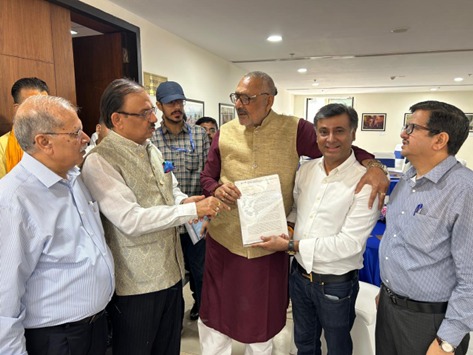EPCH Urges Government Intervention to Safeguard Indian Wooden Handicrafts Exports
Delhi/NCR, 21st August 2025 – A High level delegation of handicrafts exporters led by Sagar Mehta, Vice Chairman, EPCH and Dr. Rakesh Kumar, Director General in the role of Chief Mentor EPCH and Chairman – IEML met Giriraj Singh, Union Minister of Textiles, Govt. of India; Gajendra Singh Shekhawat, Union Minister of Tourism and Culture, Govt. of India to discuss and request the Govt. of India to intervene in the compliance of European Union Deforestation Regulations (EUDR).
The meetings also saw presence of R. K. Verma, Executive Director, EPCH and Manoj Bothra, Rajendra Bansal, J. P. Jain, Ashish Mehta, prominent member exporters from Jodhpur, Gaurav Jain, Manish Purohit and Parminder Singh, prominent member exporters from Saharanpur were present informed Rajesh Rawat, Addl. Executive Director -EPCH.
The delegation also met high level officials to discuss the matter in detail.
Concerning the impact of EUDR, Dr. Neeraj Khanna, Chairman-EPCH, said “While we appreciate the EU’s commitment to combating deforestation, but the EUDR compliance requirements could severely impact our wooden handicrafts exporters. Our wooden handicrafts are primarily made from Mango, Acacia and Sheesham wood which are sourced largely from agroforestry. These species are grown outside natural forests and do not contribute to deforestation.”
“We believe that such stringent compliance requirements, if implemented without contextual adjustments, could lead to significant disruptions. Many artisans and MSME exporters may lose access to EU markets, resulting in reduced production, cancelled orders and widespread unemployment among artisans and their dependents.” Dr. Khanna further added.
Highlighting policy level engagement and support, Dr. Rakesh Kumar, Director General in the role of Chief Mentor EPCH and Chairman – IEML shared that “The handicrafts sector is the economic backbone for millions of artisans in rural and semi-urban India. Despite the sustainable nature of sourcing, EUDR places uniform obligations on all timber exporters, disregarding contextual differences in countries like India. Without government intervention, compliance with EUDR could become prohibitively complex for our exporters. We need a collective approach that combines regulatory support and engagement with the EU.
He further urged Ministry of Commerce & Industry to engage with the EU for seeking exemptions for Mango, Acacia, and Sheesham wood and Ministry of Environment, Forest & Climate Change and Ministry of Agriculture & Farmers Welfare to issue directives to field formations for providing geo-location data at the time of harvesting, enabling exporters to establish a deforestation-free chain of custody.”
Sagar Mehta, Vice Chairman – EPCH said that “The European Union’s deforestation regulations present a critical challenge for wooden handicraft exporters, particularly MSMEs and artisan-based enterprises. While we fully support sustainable and responsible trade, it is essential to recognize the unique nature of our wooden handicrafts sector, which relies on agroforestry and does not contribute to deforestation. We request a collaborative approach involving government bodies, industry stakeholders to develop a pragmatic compliance framework that protects our artisans while meeting global sustainability goal”.
R. K. Verma, Executive Director, EPCH said “EPCH has always been committed towards aligning with global sustainability frameworks through initiatives like “Vriksh” Timber Legality Assessment and Verification Scheme, an internationally recognized system that assures the legality and sustainability of wood sourcing. However, large-scale implementation of geo-referenced traceability systems requires policy support, funding and international engagement. This collective approach will ensure compliance while safeguarding India’s export competitiveness.”
Export Promotion Council for Handicrafts is a nodal agency for promotion of exports of handicrafts from the Country and create brand image of magic of the gifted hands of millions of craftspersons engaged in production of home, lifestyle, textiles, furniture and fashion jewellery & accessories products in different craft clusters of the Country. The overall Handicrafts exports during the year 2024-25 was Rs. 33,123 Crores (US $ 3,918 Million) and the exports of wooden Handicrafts during the year 2024-25 was 8524.74 crores (US$ 1008.04 million) registering a growth of 6% in rupee term and 3.84% in dollar term with exports to European Union alone stood at ₹2,591.29 crore (USD 306.40 million) informed by R. K. Verma, Executive Director, EPCH.



Comments are closed.